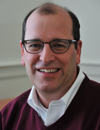Protecting the Capitol After the January 6 Riot Didn’t Deter Paul Cooper from Earning His MBA, Only Delayed It
On Jan. 6, 2021, Paul Cooper and his wife were celebrating their three-year anniversary over dinner at home when his phone lit up. He was to report the following morning for duty. The next evening, he and his unit stood guard at the Capitol building in Washington, D.C., where he spent 30 days, including during the presidential inauguration.
“Fortunately, nothing major happened at the Capitol, and no one was hurt or injured after the 6th,” says Cooper, who recently earned an M.B.A. from University of Maryland Global Campus.
Cooper’s wife was pregnant at the time, which made it scarier to not know how long he would be gone, and the pandemic was a concern given the tight living conditions for him and his colleagues, who weren’t yet able to vaccinate.
Having just finished his first assignment in a course, Cooper was anxious to stay on track, but he contacted his professor at UMGC, who said the course was very intensive. He decided to drop out that semester, in part to maintain his 4.0 GPA. He knew he would re-enroll the following semester—which he did—but he was disappointed to part with his cohort, to which he had grown attached.
Cooper engaged in independent study and preparation after his activation ended, and he and his former cohort stayed in touch. Classmates would text and check in on him. He got back on track and having now finished his degree and with military benefits remaining, he is weighing future options, including a second master’s degree, a doctorate, or several graduate certificates.
“I feel so accomplished,” says the Cincinnati native, who helps manage a traumatic brain injury clinic as a health systems specialist for the Defense Health Agency. “I know that this has opened the door for me in my current position to advance and get me to those upper-level management positions. I would like to hopefully manage a clinic at a military treatment facility.”
After graduating from the College of Mount Saint Joseph, where he played football and majored in history, Cooper taught junior high school at a small charter school. He had recently married and had two young children, so he decided to join the military to support his family and to repay his student loans.
While stationed at Walter Reed National Military Medical Center, Cooper was able to meet a UMGC advisor face-to-face, which was hard to do with other schools. The advisor was very helpful and explained the process, he recalls. He was weighing a second bachelor’s in education, but the advisor helped him get into the M.B.A. program.
He recommends UMGC to working adults who have been out of school for a while or want to study with other adults. “It helps to ease a lot of fears and tension about working in groups,” he says. “We all understood that we all had competing priorities and were willing to give each other grace. I think the teamwork and support were so important. We had so many different abilities that you could always find someone with experience in each of the subjects that we had.”

Share This